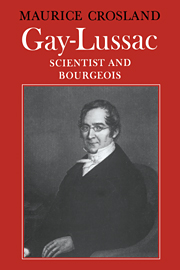Book contents
- Frontmatter
- Contents
- Preface
- Chronological table
- List of abbreviations
- 1 A young provincial in Paris
- 2 The apprentice of Arcueil
- 3 Personal influences and the search for laws
- 4 Collaboration and rivalry
- 5 The volumetric approach
- 6 Scientific research
- 7 Professor, Academician and editor
- 8 A scientist in the service of government and industry
- 9 A new technique and the dissemination of technical information
- 10 Scientist and bourgeois in the political arena
- 11 The legacy
- Appendix: select correspondence
- Notes
- Select bibliography
- Name index
- Subject index
10 - Scientist and bourgeois in the political arena
Published online by Cambridge University Press: 03 November 2009
- Frontmatter
- Contents
- Preface
- Chronological table
- List of abbreviations
- 1 A young provincial in Paris
- 2 The apprentice of Arcueil
- 3 Personal influences and the search for laws
- 4 Collaboration and rivalry
- 5 The volumetric approach
- 6 Scientific research
- 7 Professor, Academician and editor
- 8 A scientist in the service of government and industry
- 9 A new technique and the dissemination of technical information
- 10 Scientist and bourgeois in the political arena
- 11 The legacy
- Appendix: select correspondence
- Notes
- Select bibliography
- Name index
- Subject index
Summary
‘What society holds most dear and most sacred is the free exercise of intelligence and respect for property’
Gay-LussacThere may be some scientists whose whole life is in their laboratories. But, if a scientist applies his special expertise in commerce and industry, he obviously relates to the wider world outside the laboratory. If he accepts rewards for such work, he becomes involved in the society of his time. This is all the more so if the rewards are substantial, enabling the scientist to aspire to a superior social position. But science, through its applications, can relate not only to private life but also to public life. If a scientist stands as a member of parliament, he immediately becomes a public figure. If in the course of his public office he expresses opinions on government policy and legislation affecting science and technology, then he is fully involved in contemporary society. Such a man was Gay-Lussac. He did not divide his life into two separate compartments: science and private life. In an alphabetical file of his papers we find not only pure science and industrial tariffs together, but also papers on his tax assessment next to papers on electrical instruments.
Gay-Lussac played an important part in the economic life of France not only by his advice on the analysis of coinage but by his many expert contributions to the system of taxation.
- Type
- Chapter
- Information
- Gay-LussacScientist and Bourgeois, pp. 226 - 247Publisher: Cambridge University PressPrint publication year: 1978



